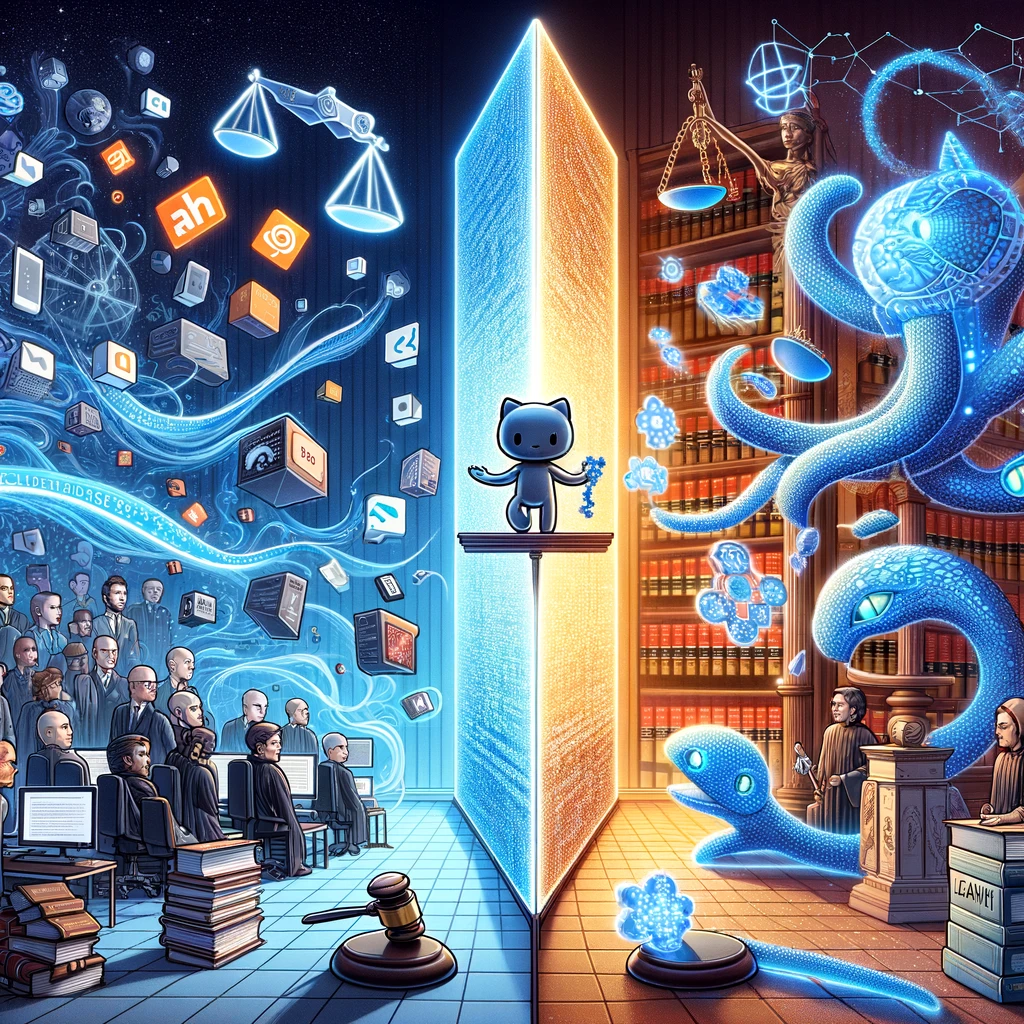GitHub’s Legal Challenges with AI
In the rapidly evolving world of artificial intelligence (AI), GitHub stands at the forefront, championing innovation while navigating a complex web of GitHub’s Legal Challenges with AI. The popular platform, known for hosting and facilitating collaboration on software development projects, has increasingly integrated AI technologies to enhance productivity and creativity. However, with great innovation comes great scrutiny, particularly in the legal arena where AI’s capabilities and implications are still being explored and understood.
GitHub’s AI Integration: A Leap into the Future (GitHub’s Legal Challenges with AI)
GitHub has made significant strides in integrating AI into its services. Tools like Copilot, designed to assist developers by suggesting code snippets and improving workflow, epitomize the potential of AI to revolutionize software development. These advancements not only boost efficiency but also democratize coding, making it accessible to a broader range of individuals with varying levels of expertise.
The Legal Labyrinth
However, GitHub’s pioneering efforts have not been without their legal entanglements. The integration of AI into tools like Copilot raises questions about copyright, data privacy, and the ethical use of AI. One of the primary legal challenges revolves around the nature of the code generated by AI: Who owns it? Is it the original creator of the dataset the AI was trained on, the user who prompted the AI, or the platform that developed the AI? These questions are at the heart of ongoing legal debates.
Copyright Concerns
Copyright law, designed to protect the rights of creators, finds itself at odds with AI-generated content. The crux of the issue lies in determining whether AI-generated code is considered a derivative work or an entirely new creation. This distinction is crucial, as it impacts the rights of software developers and the open-source community GitHub serves.
Data Privacy and Security
Data privacy is another critical concern. AI systems require vast datasets for training, raising questions about the source of this data and the consent of individuals whose code contributions may be included. Ensuring that AI tools respect user privacy and adhere to data protection regulations is paramount in maintaining trust and compliance.
Ethical Use of AI
Beyond legalities, the ethical implications of AI in software development cannot be overlooked. Issues of bias, fairness, and the potential for misuse of AI tools necessitate clear guidelines and robust ethical frameworks. As GitHub navigates these challenges, the company’s policies and practices regarding AI become a blueprint for the industry.
Moving Forward: GitHub’s Response and Industry Implications
In response to these challenges, GitHub has engaged in ongoing dialogue with the legal community, policymakers, and the broader tech industry. The company’s efforts to address copyright concerns, ensure data privacy, and uphold ethical standards in AI reflect a commitment to responsible innovation. Additionally, GitHub’s participation in discussions around the AI Act highlights its proactive stance in shaping the future of AI regulation.
The Road Ahead
As AI becomes increasingly integral to software development, the legal and ethical conundrums encountered by GitHub, particularly GitHub’s Legal Challenges with AI, are set to intensify. This scenario offers a comprehensive look into the complexities that modern tech enterprises, ranging from fledgling startups to established behemoths, and even regulators, must navigate. It highlights the critical importance of fostering a culture of innovation that does not lose sight of legal safeguards and ethical norms. This balanced approach is pivotal for steering the future of technology in a direction that not only champions progress but also upholds fundamental legal and ethical principles.
As AI’s integration into software development deepens, the spotlight on GitHub’s Legal Challenges with AI grows brighter, signaling a critical juncture for the tech industry. GitHub’s Legal Challenges with AI serve as a stark reminder of the intricate balance that must be maintained.
In conclusion, GitHub’s Legal Challenges with AI serve as a microcosm of the broader issues at play in the tech industry. As we venture further into the AI era, the solutions and compromises forged today will undoubtedly shape the trajectory of innovation for years to come. For GitHub and the tech community at large, the path forward is fraught with complexity but also brimming with the promise of transformative possibilities.
For more information or updates visit our website.

